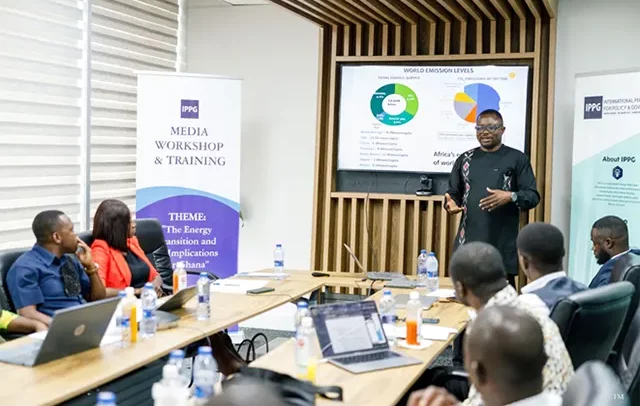Dr. Robert Bright M. Sogbadji delivering a presentation
The International Perspective for Policy and Governance (IPPG) in partnership with the Ghana Chamber of Clean Energy (GCCE) has organised a media training and workshop on the theme “The Energy Transition and its Implications for Ghana” in Accra.
The workshop brought together journalists and media practitioners to enhance their understanding of the country’s clean energy transition and its broader social, economic, and policy implications.
The training forms part of IPPG’s efforts to build the technical capacity of the media to accurately report on Ghana’s energy transition agenda and support national conversations on sustainability, climate action, and green growth.
Speaking at the workshop, Senior Research Fellow for Climate and Energy at IPPG, Seth Owusu-Mante, emphasised that the energy transition represents not just a shift in technology but a structural transformation of the country’s economy for job creation and economic prosperity.
He highlighted the role of journalists in contextualising this transformation and bridging the information gap between policymakers and citizens.
The workshop also featured presentations from Dr. Robert Bright Mawuko Sogbadji, Deputy Director for Nuclear and Alternative Energy at the Ministry of Energy and Green Transition; Dr. Charles Gyamfi Ofori, Policy Lead for Climate Change and Energy Transition at the Africa Centre for Energy Policy (ACEP); and Mr. Yaw Appiah Lartey, Africa Head of Infrastructure, Capital Projects and Real Estate at Deloitte & Touche.
In his address, Dr. Sogbadji commended IPPG and GCCE for creating an avenue to engage the media on the country’s new energy and green transition agenda, underscoring the importance of clear communication and stakeholder collaboration to drive public support for the country’s climate and energy ambitions.
He added that the country’s Energy Transition Framework will require an estimated US$562 billion through 2070 and is projected to create more than 1.4 million new jobs, driven by the deployment of advanced technologies such as CCUS, nuclear power, hydrogen, and electric mobility.
Dr. Ofori emphasised the need for evidence-based reporting on the economics of the transition and its implications for employment, energy access, and industrial competitiveness.
He also stressed that Ghana and Africa must be intentional about leveraging its renewable resources, critical minerals, and technological innovations to unlock sustainable economic growth through the energy transition.
Mr. Yaw Ofosu Lartey provided insights on financing opportunities and the private sector’s role in accelerating Ghana’s transition and emphasized that clear policy signals, bankable project pipelines, and strengthened regulatory frameworks are essential to unlock the scale of capital required.
A Daily Guide Report


